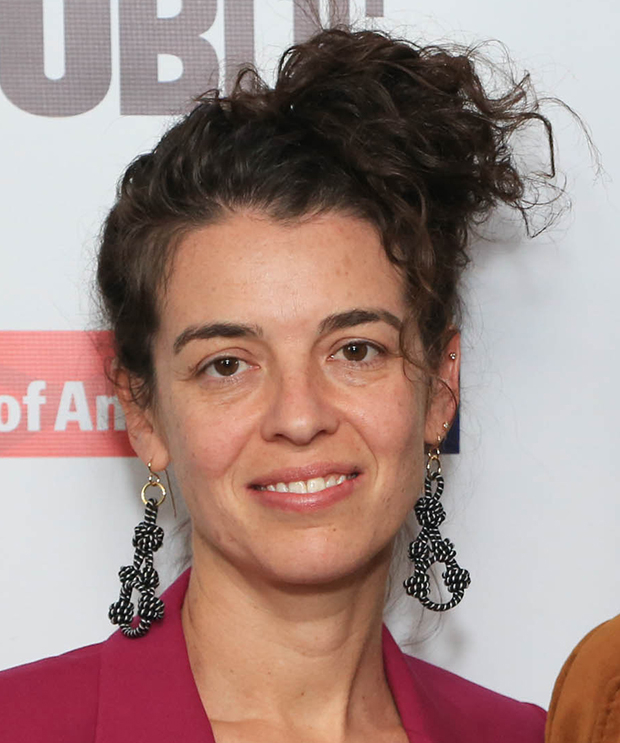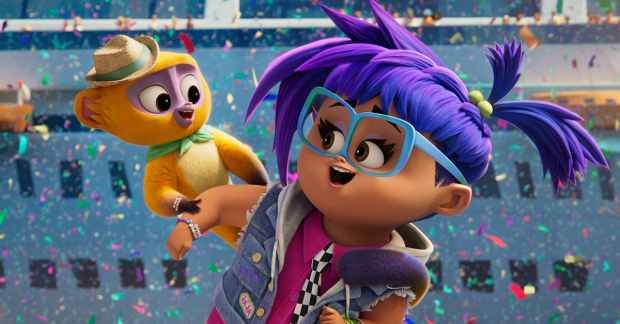Interview: Quiara Alegría Hudes On Vivo Thrills and Writing Compelling Characters
Hudes talks about her second film to come out this summer.
Quiara Alegría Hudes has been so good for so long that we, as audience members, sometimes take her for granted. We enter a theater expecting a certain level of excellence, and Hudes delivers. We complacently accept it as our due, but there's nothing complacent about Hudes.
After making her screenwriting debut with the highly-anticipated adaptation of In the Heights, the relentlessly curious playwright, memoirist, and screenwriter finds her work onscreen for the second time this year in Netflix's Vivo.
Co-written with Kirk DeMicco, Vivo centers around Cuban street singer Andrés and his kinkajou partner Vivo voiced by Lin-Manuel Miranda, who spend their days playing music in a crowded square. Their lives are upended when Andrés receives a letter from his former music collaborator inviting him to her farewell concert in Miami.
Hudes spoke with TheaterMania about where she found inspiration for her characters, giving young people the opportunity to see themselves in her characters, and the film's surprising twist.

(© Tricia Baron)
Spoilers about the movie Vivo ahead!
Gabi's positivity and boundless joy stood out to me the most. Were any aspects inspired by your sister Gabi?
A lot of it was inspired by her! There's this scene in My Broken Language that is such a Vivo Gabi story where my sister catches her reflection in the mirror, and she's like, "My belly is round as Mother Earth!" It's that sense where she will celebrate herself even when the world tells her those are not things to celebrate, and I wanted to write a character like that for kids.
When you sit down to write, do you start with an image or a piece of dialogue? Is there something that serves as your entry point to what you're working on beyond topic or form?
One thing that's consistent across mediums is that I usually start with a character. I think of characters as energies, so once I have my constellation of stars, the different energies, I try to put a scaffolding of a story that connects them. I knew Andrés; I knew Vivo. Marta [Gloria Estefan] changed a lot because there are so many divas she could be, and the way they animated her ended up being different from what I had imagined, so I ended up doing more rewriting for her.
You've been in conversation with different mediums for some time now. You published My Broken Language in April, and we can't forget the In the Heights film adaptation. Are there things that can happen in a theatrical experience that simply can't be replicated in film?
There are similarities, but for me, playwriting is more improvisatory. I'm more like Gabi where she's like, "Loosen up, go with the flow!" It's like surfing. I get on my surfboard and ride that wave. Sometimes a scene becomes 20 minutes long and has this big musical thing [laughs]. I've found that with screenwriting, both for In the Heights and Vivo, my Vivo side comes out, that part of me that's more interested in precision and in being more strategic. You can't improvise a 20-minute scene! I have to be more thoughtful and precise when I'm building from scene to scene.

(© SPAI)
Grief is part of a significant plot point in Vivo, but putting something so tricky into writing can be strenuous, especially if you're writing for a younger audience. Thinking about the movie, do you think that we fully return to reality after a loved one passes away, or do you think it stays with us for a bit, and maybe it permanently alters our perception of reality?
It must follow me because I can feel it in my body as you're asking that question. It's hard. We didn't intend for the movie to come out during a pandemic. It's not just a grief story, but that's a big part of it.
The problem with grief is the same problem with life: we're humans, and we're flawed. We live those flaws when we love each other and live those flaws when we grieve each other. It makes me think of Vivo's last moment with Andrés, where he had a temper tantrum. That becomes a point of obsession for Vivo as he has to grieve. He thinks he didn't honor Andrés because that was his last moment with him, but of course, we're watching him thinking how he honored him every day and was a wonderful musical partner. But Vivo can't reconcile that and has to build a final memory that helps him sleep better at night, and delivering the song is that.
To quote a line from the movie," What difference does a song make?" Do you think great writing can save the world? Make of this what you will.
I know it can because the world is built one life at a time, but in a pandemic time, the notion of saving the world feels bigger than I can conceptualize. Great writing expanded my horizons, challenged my lazy thinking, prejudices, and small-mindedness. It also made me feel like I had a narrative that mattered. When I write a character like Gabi, I'm trying to say that a hero or lead character can look like her. I hope that maybe that sentiment reaches one person and they realize they also have a story to tell, so my small version of saving the world is passing the baton forward. I feel okay if only one person grabs that baton and then tells their story.








